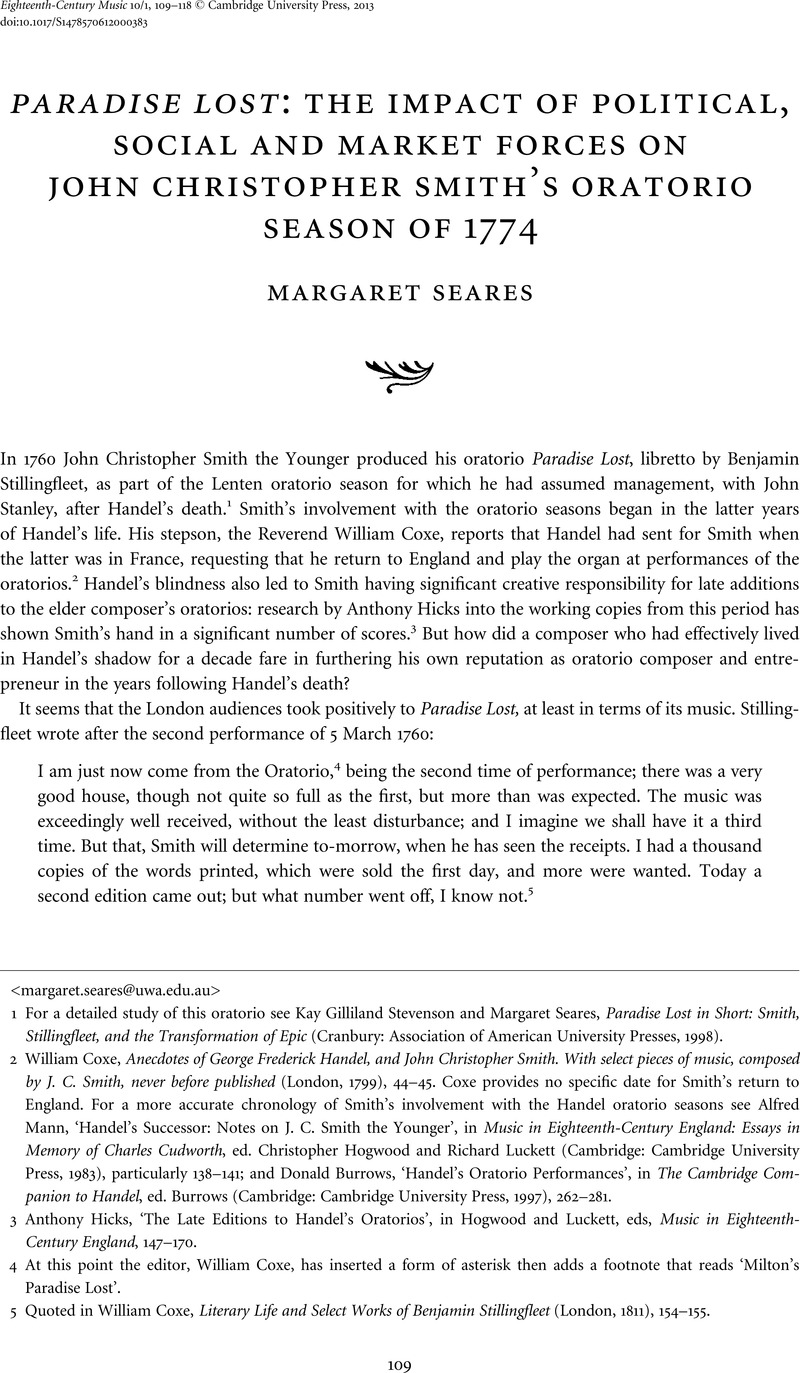No CrossRef data available.
Article contents
PARADISE LOST: THE IMPACT OF POLITICAL, SOCIAL AND MARKET FORCES ON JOHN CHRISTOPHER SMITH'S ORATORIO SEASON OF 1774
Published online by Cambridge University Press: 06 February 2013
Abstract

- Type
- Essays
- Information
- Copyright
- Copyright © Cambridge University Press 2013
References
1 For a detailed study of this oratorio see Stevenson, Kay Gilliland and Seares, Margaret, Paradise Lost in Short: Smith, Stillingfleet, and the Transformation of Epic (Cranbury: Association of American University Presses, 1998)Google Scholar.
2 Coxe, William, Anecdotes of George Frederick Handel, and John Christopher Smith. With select pieces of music, composed by J. C. Smith, never before published (London, 1799), 44–45Google Scholar. Coxe provides no specific date for Smith's return to England. For a more accurate chronology of Smith's involvement with the Handel oratorio seasons see Mann, Alfred, ‘Handel's Successor: Notes on J. C. Smith the Younger’, in Music in Eighteenth-Century England: Essays in Memory of Charles Cudworth, ed. Hogwood, Christopher and Luckett, Richard (Cambridge: Cambridge University Press, 1983), particularly 138–141Google Scholar; and Burrows, Donald, ‘Handel's Oratorio Performances’, in The Cambridge Companion to Handel, ed. Burrows, (Cambridge: Cambridge University Press, 1997), 262–281CrossRefGoogle Scholar.
3 Hicks, Anthony, ‘The Late Editions to Handel's Oratorios’, in Hogwood, and Luckett, , eds, Music in Eighteenth-Century England, 147–170Google Scholar.
4 At this point the editor, William Coxe, has inserted a form of asterisk then adds a footnote that reads ‘Milton's Paradise Lost’.
5 Quoted in Coxe, William, Literary Life and Select Works of Benjamin Stillingfleet (London, 1811), 154–155Google Scholar.
6 See Dean, Winton, Handel's Dramatic Oratorios and Masques (London: Oxford University Press, 1959), 471–473Google Scholar, and Smither, Howard, A History of the Oratorio, volume 2 (Chapel Hill: University of North Carolina Press, 1977), 300–306Google Scholar.
7 Langhans, Edward A., ‘1776: A Critical Year in Perspective’, in The Cambridge History of British Theatre, volume 2: 1660–1895, ed. Donohue, Joseph (Cambridge: Cambridge University Press, 2004), 193Google Scholar.
8 Ilias Chrissochoidis, ‘true Merit always Envy rais'd: The Advice to Mr. Handel (1739) and Israel in Egypt's Early Reception’, The Musical Times 150 (Spring 2009), 69–86.
9 Smith, Ruth, Handel's Oratorios and Eighteenth-Century Thought (Cambridge: Cambridge University Press, 1995), 20CrossRefGoogle Scholar.
10 Both these theatres were royal-patent theatres, and both carried the title ‘Theatre Royal’. For clarity, they will be referred to simply as Drury Lane and the Haymarket (and their various eighteenth-century spellings when being cited) for the remainder of this essay. For background on these theatres and the London theatre scene of the first part of the eighteenth century see Judith Milhous and Robert D. Hume, ‘Handel's London: The Theatres’, in The Cambridge Companion to Handel, 55–63.
11 François-Hippolyte Barthélemon (born 1741; died 1808) was a French violinist and composer who was a leading figure in English musical life during the latter part of the century. See Neal Zaslaw and Simon McVeigh, ‘Barthélemon, François-Hippolyte’, in Grove Music Online <www.oxfordmusiconline.com> (8 November 2011).
12 Zöllner, Eva, ‘Handel and the English Oratorio’, in The Cambridge History of Eighteenth-Century Music, ed. Keefe, Simon P. (Cambridge: Cambridge University Press, 2009), 554Google Scholar.
13 A complete listing of performances for each year is contained in The London Stage 1660–1800, part 4: 1747–1776, ed. Stone, George Winchester Jr (Carbondale: Southern Illinois University Press, 1962), volume 2Google Scholar.
14 Coxe, Anecdotes of George Frederick Handel, and John Christopher Smith, 53.
15 Quoted in The London Stage, part 4, volume 2, 1875.
16 The advertisements for Drury Lane appeared primarily in The Public Advertiser, while the Haymarket also used The Gazetteer and New Daily Advertiser.
17 The Public Advertiser (24 February 1774), 1.
18 The Gazetteer and New Daily Advertiser (26 February 1774), 3.
19 Samuel Arnold, Omnipotence, Preface, 4. British Library catalogue RB.23.b.901.
20 The Public Advertiser (7 March 1774), 1.
21 The Public Advertiser (12 March 1774), 1.
22 The Morning Chronicle and London Advertiser (26 February 1774), 2.
23 The Morning Chronicle and London Advertiser (3 March 1774), 2.
24 The Morning Chronicle and London Advertiser (4 March 1774), 2.
25 ‘The friends of Mr. Coleman rejoice at his abdication of so troublesome a situation as the management of a theatre; they flatter themselves that his genius will now have time to exercise itself – most highly for his own fame and reputation.’ The Morning Chronicle and London Advertiser (5 March 1774), 3.
26 The Morning Chronicle and London Advertiser (7 March 1774), 4.
27 The Morning Chronicle and London Advertiser (8 March 1774), 2.
28 ‘Vashon’ was Pierre Vachon, a violinist who performed concertos between the acts of Drury Lane oratorios in 1774. See Michelle Garnier-Butel, ‘Vachon [Vasson, Waschon], Pierre’, in Grove Music Online <www.oxfordmusiconline.com> (8 November 2011).
29 The Morning Chronicle and London Advertiser (11 March 1774), 4.
30 The Morning Chronicle and London Advertiser (11 March 1774), 4.
31 That Smith had not been completely blind to the potential of using the pasticcio oratorio as a means of borrowing little-known music is noted in King, Richard's article ‘John Christopher Smith's Pasticcio Oratorios’, Music & Letters 79/2 (1998), 190–218CrossRefGoogle Scholar.
32 Arnold, Omnipotence, Preface, 4.
33 See McVeigh, Simon, Concert Life in London from Mozart to Haydn (Cambridge: Cambridge University Press, 2006), 28–32Google Scholar, and Zöllner, Eva, English Oratorio after Handel: The London Oratorio Season and Its Repertory, 1760–1800 (Marburg: Tectum, 2002)Google Scholar, for discussions of the mixed fortunes of the Handelian oratorio in the years following the composer's death.
34 The Gazetteer and New Daily Advertiser (25 February 1774), 1.
35 Coxe, Anecdotes of George Frederick Handel, and John Christopher Smith, 55.
36 Coxe, Anecdotes of George Frederick Handel, and John Christopher Smith, 58.
37 Weber, William, The Rise of Musical Classics in Eighteenth-Century England (Oxford: Clarendon, 1992), 7–8Google Scholar.


